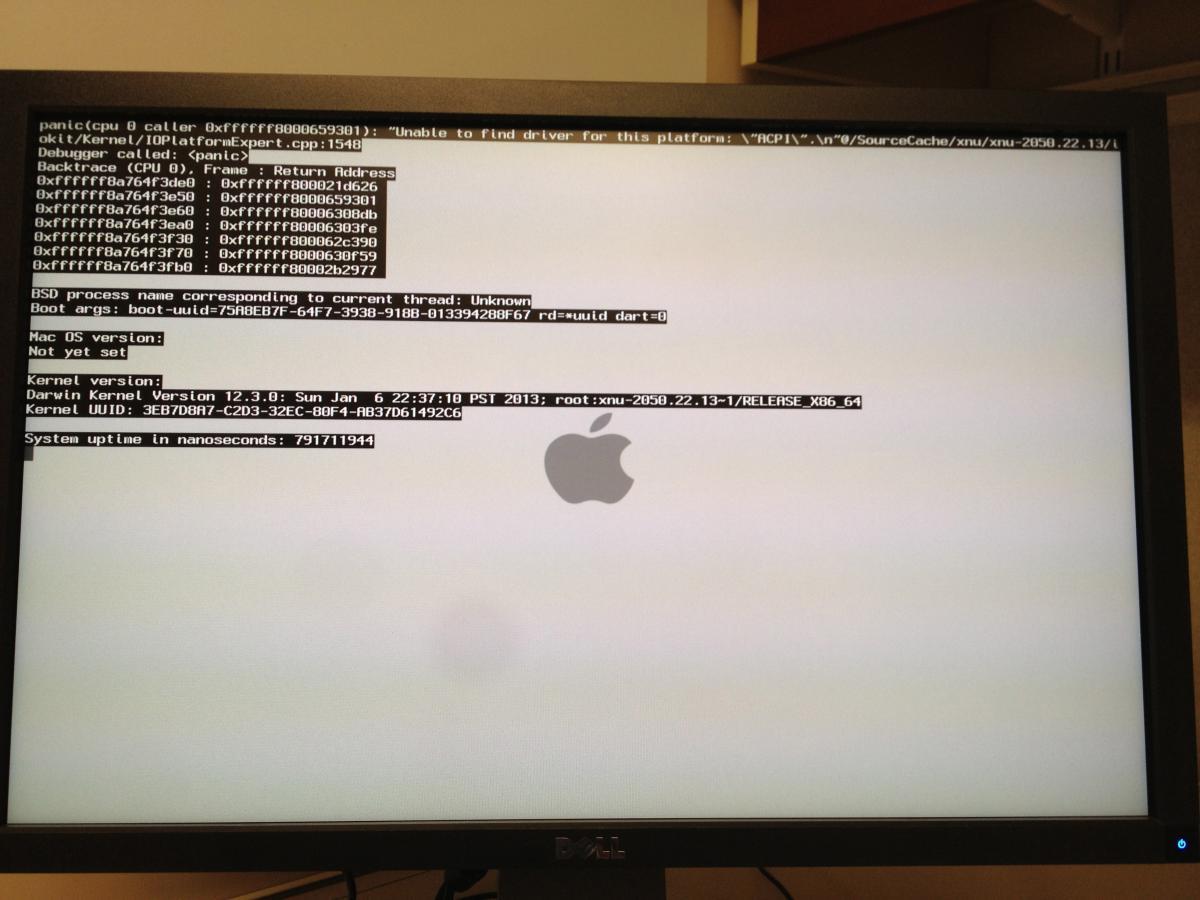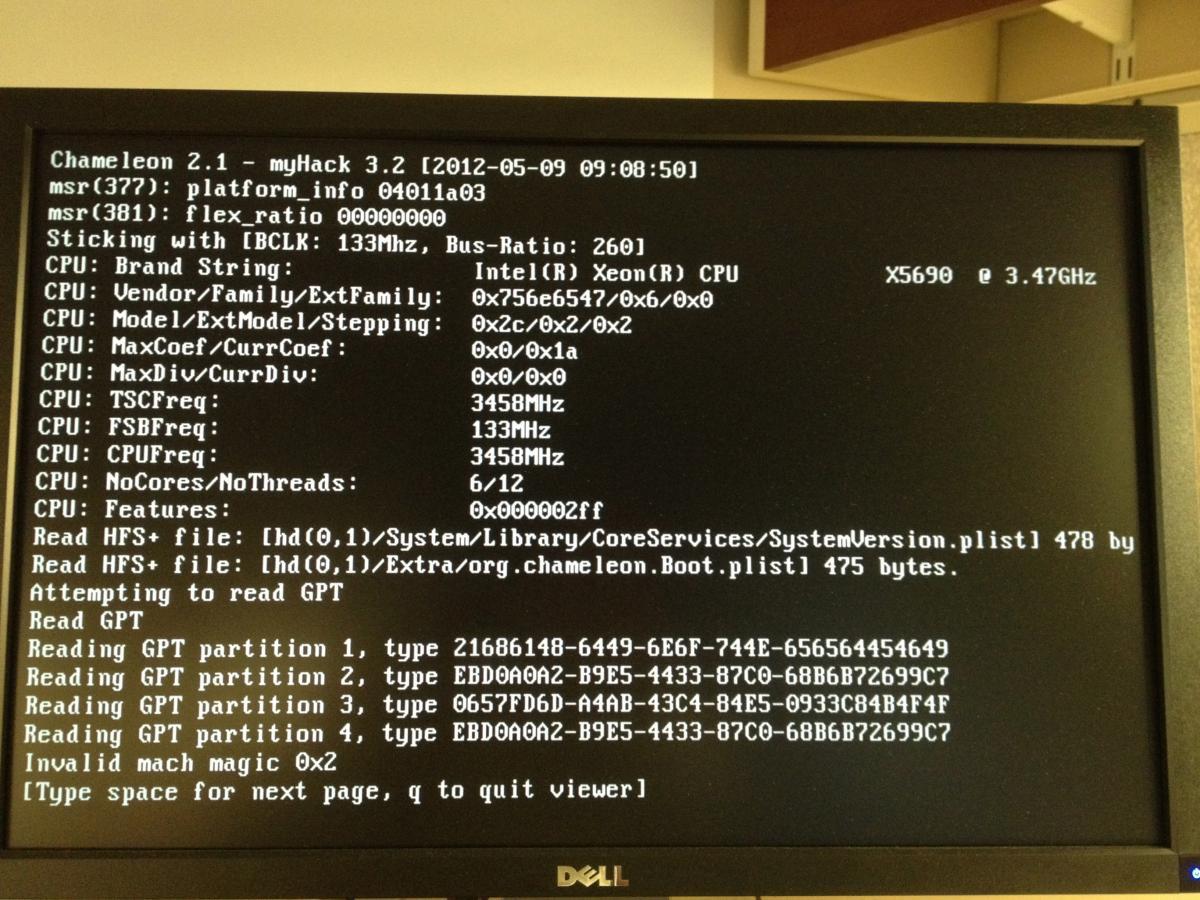
roror
-
Posts
17 -
Joined
-
Last visited
Content Type
Profiles
Articles, News and Tips
Forums
Posts posted by roror
-
-
Still the same "Unable to find driver for this platform: \"ACPI\".\n"@SourceCache/xnu ... " problem.
Ran myfix this time. Also tried -x -f acpi=off PCIRootUID=0 GraphicsEnabler=No
Same problem. It seems like I am not looking at the right place, or missing some one step somewhere.
-
Hmm. Can't seem to find the ACPIPatcher.dylib file anywhere. Closest I could find was acpicodec.dylib. Could you please point me to the URL where I can get it from?
-
OK. I'll try that.
-
No. I am not sure how to use the Chameleon modules. Is there a guide somewhere?
-
OK. Re ran the myfix, but same problem. Perhaps the problem is somewhere else.
-
Thanks for the suggestions. I removed the AppleACPIPlatform.kext from the s/l/e folder, ran myfix, same error on boot. This time I didn't see any AppleACPIPlatform.kext in the Extra/Extensions folder.
Installed 1.3.5 version into /Extra/Extensions using kext wizard, same error. dart=0 didn't change anything. Tried 1.6 version as well, as some had suggested it for the mountain lion. But, didn't help.
See the picture of the error. Any other suggestion?
I don't think I can use EDP because my system (precision T7500 workstation) isn't yet supported, right?
-
After I got the DSDT from Dinesh I had similar problem. The error message was something like .. Should have X cores but found Y. I edited the DSDT file to reduce the number of processors from 32 to 24, thinking that there are 12 cores total, each with hyperthreading enabled may appear as total of 24 cores. The error related to number of cores went away, but the boot gets stuck at a different error.
Unable to find driver for this platform: \'ACPI\' ...
When I googled for it, it seems that lot of people have had this error in the past, but I didn't see a clear solution. Tried a bunch of things like acpi=off and platform=x86pc, etc. But, always kept getting the same error. What could be causing this?
Thanks for any help. I really hope to get OS X running on this machine some time soon.
-
I must be doing something wrong. I processed the DSDT through this program and then put the two generated files in the Extra folder on the installer. Tried to boot the computer from the USB key. Got the same result.
Now waiting for a patched DSDT from Dinesh. Hopefully that'll do it.
-
moin think the cpu where not propper recogniced ... i had this problem with my t3400 from dell try to boot an run multifail and set your hackmac as mac pro3,1 on my problem that helped !
cheers
dornkaat
So, you didn't have any problem installing, right? Because as I understood multifail works from a installed system, right?
-
Thanks a lot for doing this favor to the community. Just sent you the required files for my system. My email address is ror****@gmail.com
It's a dell precision T7500 system. It has
Two xeon x5690 cpus
A perc6/i raid card that creates a raid 10 with total 4TB usable space,
96GB ram
nvidia GTX 460 with 1GB memory
My previous attempts are here : https://osxlatitude.com/index.php?/topic/1971-precision-workstation-t7500-smp-2cpu-hackintosh/?p=18044
So far unable to boot the installer to get to the installation screen.
Thanks in advance.
-
After reading https://osxlatitude.com/index.php?/topic/1370-dell-precision-t7500-and-osx/?hl=%2Bprecision+%2Bt7500 I am wondering I need a patched DSDT file? Yesterday I tried extracting the DSDT file using the DSDT editor and then compiled it. But, not sure if it was done right. I am no DSDT patching expert. There were few compile errors and warnings and I had no idea. That DSDT file didn't help me get to the install screen either.
I can extract and post the DSDT file if that'll help. The machine has a working linux installation on it now.
Thanks again.
-
Thanks. No invalid mac magic error now, but, a similar error as before afterwards. I'll have to record what it printed and watch it frame by frame to figure out the error.
-
The two boot options didn't help. Where can I get a recent build of chameleon? http://forge.voodooprojects.org/p/chameleon/downloads/ has r2109.
http://forge.voodooprojects.org/p/chameleon/source/tree/HEAD/ seems to have the more recent version, but Do I have to check out and compile?
Thanks
-
I don't think I tried that with myHack. Did try it with unifail earlier though.
So, now when I booted myHack usb with cpus=1 I got the following new message : see screenshot.
"Invalid mac_magic" ?
Very similar result with cpus=2 as well.
Edit 1: And yes. it continued to print a few more error quickly and rebooted.
Edit 2: Just realized that the screenshot attached is just the first page of the output. Not very useful. But, let me know if I can post any other info.
-
And similar error when I tried installing Lion instead of Mountain Lion.
-
Another with a dell precision dual xeon. I am getting a similar error. First it gave an error "Should have 6 cores but found 5". I thought let's use only one core per cpu by setting the option in bios. Then the error was "should have 1 thread but only found 2". stack traced to AppleACPIPlatform driver. Any help will be deeply appreciated. Thanks.



(Precision Workstation T7500) SMP-2CPU-Hackintosh
in The Archive
Posted
Hey, same result. See the attached picture.